#also this gives me an excellent platform to reveal a little of That Backstory
Explore tagged Tumblr posts
Text
Spots
(A/N: Finally got this one done- Sequel to this piece, because I love.)
Words: 2.8k
Warnings: Mentions of blood, violence, and some manipulation/abuse themes from Syb’s past though all of it’s only mentioned vaguely.
Sybilla Livsdottir x Amalia Sydgården from @greyvvardenfell
*
They, both of them, are no strangers to ghosts of the past.
*
“We could just go home, darling,” Sybilla pressed a kiss to the top of Amalia’s head, and held her closer, careful not to wrinkle the band of white silk roses around her waist.
Still clinging to Sybilla for dear life as she’d been all evening, Amalia shook her head stubbornly. “He can’t drive me away from my party.”
Sybilla held her tongue, knowing that reminding Mali that it was not, in fact, her party was not bound to go well.
Or, well. It might as well have been. Sybilla wouldn’t have come here at all, to this distinctly uninteresting guest list and distinctly ridiculous schmoozing made only slightly more tolerable by Lucio’s hosting skills and having Amalia on her arm, hadn’t the latter been so understandably terrified by what tonight meant.
Perhaps it was her party, then. At least as far as Sybilla was concerned. She wasn’t here for anyone else.
Before she could open her mouth to tell her just that, there was a rustle of silk from behind them, and as if on instinct, Amalia folded to her side, nails digging so hard into Sybilla’s sleeve that she winced.
“Come on now, little sister.” The voice was flat, stretched out into a drawl that instantly made Sybilla’s hackles rise. “Is that any way to greet your king?”
Sybilla hardly needed to feel Amalia trembling against her, struggling to find the words, when she turned around, full force, summoning a silent enchantment to keep Amalia even further out of harm’s way, and faced him.
With some satisfaction, she watched the switch flip.
Owyn Sydgarden was- shiny. Shiny in a way that was more greasy than brassy, with neither Lucio’s charisma or Mali’s charm- his doublet and coronet and the many rings glittering on his fingers couldn’t make up for the strange staleness of his pallid face.
At the sight of Sybilla, the bluster in his wide grin fell away to shock, and even through the generous coating of rouge on his cheeks, she could catch how he paled even more. Bristling in his doublet, his jaw dropped, and instinctively, he took a step back.
Owyn gaped at her for a few moments more, his mouth opening and closing like a fish out of water, and then he tried to collect himself, gathering his furs and about him.
Like that would help. “You.”
Sybilla raised an eyebrow, painted as black as the freckles on her pale skin. “Yeah.” She folded her arms, tilting her head to look at him from beneath her befeathered hat. “Me.”
“If you’re attempting something, Amalia, in the company of this-“ he narrowed his eyes- “this blood witch-“
Oh.
A favorable illusion.
It had been a while since she spoke Naigen, and when she did, it was still sharpened by the accent from her own native language. And just as well.
“Sangromancer.” Sybilla corrected him, taking another step closer to see him inch back. “Let’s be nice to each other, why don’t we, hm?”
“I’m warning you, if this is how you’re planning to take me down-“
Sybilla laughed, in the cutting way she’d practiced to perfection. “Take you down?” She scoffed. “Regicide is your glass of wine, isn’t it, Owyn?”
Owyn’s face flushed, and he broke out in sweat, flashing blue eyes darting from side to side as though looking for an exit.
“You’re familiar with my methods, aren’t you?” Sybilla took the time to pick up another glass of champagne, take a slow sip with her eyes still trained on him. “By the look on your face, I can tell you know that it’d be wise not to test me.”
“You can’t-“
“Alright-“ She drained the glass. “Let’s talk about more pleasant things. Two children wasn’t it? Oh, three.”
His eyes widened in horror, and he recoiled.
Sybilla smiled. “And the youngest only a child.” She let go of Amalia to circle him, tapping her gloved fingers thoughtfully to her cheek. “We do a lot to protect our children, don’t we? What’s a king without his heirs?”
“I will-” He sputtered. “I will have you-”
“Have me what?” She dropped the smile, close enough now that her face was inches from his. “Have me what, my lord? On what territory? At what cost?”
He swallowed.
“I expected you to think twice, you know,” She plucked companionably at the furs on his cape. “You and I both know what happens when you piss off someone who’s got not much to lose.”
Trailing her fingers down his arm, she snatched his glass away from him, flung it to the trash, champagne splashing against the white of his furs. “Be a good boy, leave her alone, and go home, and you won’t get back to anything unpleasant.”
Owyn puffed himself up, as though he was about to retort, held his breath. Sybilla stared him down, coolly.
Without another word, he attempted another half-hearted glower at Mali, and turned around, flagging a server down for a glass of wine.
“I wouldn’t, if I were you,” Sybilla called out, as he retreated. “Party like this, anything could’ve slipped into one of those glasses, you know.”
He froze, and slammed it down on a table, and stormed off without a backward glance, his silks and furs trailing after him.
Amalia sank into her arms, just in time for Sybilla to hold her up. “Did you really-” Her eyes were wide, flashing emerald, her hair swept over her face in a frenzy. “Sybbie, have you really-”
Sybilla shook her head, pulling her aside, away from prying eyes. “Of course not.”
“But-”
“Mali, I can’t. I can’t jeopardize Vesuvia, jeopardize you like that.”
“But I-”
“He knows me, Mali.” She said quietly. “He's coming nowhere near you.”
For a moment, Amalia looked as though she was about to argue, the stubborn frown holding on her face before it fell away, and she fell back against Sybilla’s suit jacket, sniffing weakly.
Sybilla gently brushed back her snow-pale hair, straightening the tiara that was threatening to fall off her head, and Amalia caught her breath, pulled back with another pinched frown. “Ugh, why are we still here?” She glared at the towers of food and cocktails, at the live band plucking up an amicable waltz, like they had all mortally offended her. “You’re supposed to be taking me home.”
*
She didn’t ask, not until later, when she was cocooned in several layers of perfumed fur blankets in Sybilla’s Heart District suite, the smooth ivory of her hairbrush reflecting the amber of the soft lamplight.
“Why’d he call you that?”
Sybilla startled, her hands twitching around the buttons to her sleep-shirt. “Call me what?”
“Blood-witch.” Amalia watched her, meeting her eyes in the mirror, emerald to pale green. “That’s one I haven’t heard before.”
“Haven’t you?” Sybilla frowned. “I’d have thought-” She caught herself. Maybe she’d been too young for those secrets- even as heir to the throne. There was no point dredging it up.
No point denying it, either.
“I used to practice sangromancy, when I was younger.” She rolled her eyes. “Blood-magic, as they call it.”
“Crass.”
“Mm, very.” She walked over to sit at the edge of the bed. “The reputation makes for good use, though, doesn’t it?”
Amalia ignored it. “And you don’t do it anymore?”
“No.”
Sulking, Mali combed through her silky hair, twirling the ends around her fingers. “Why?”
Sybilla grinned. “Thought you said it was crass.”
“I asked you a question.” She set the brush down, and scooted closer to Sybilla, long nails scratching insistently at her sleeve. “Why? He sounded so scared of it, that-”
“Mali.” Sybilla sat up. “I can’t.” She sighed. “I don’t need it to protect you, and I don’t need it to have your half-brother vanish from the face of this earth if he ever gives me the excuse of doing one thing out of line, and frankly,” She paused, catching the edge in her voice to soften it, “the damn thing’s not worth the price it asks of me.”
Amalia searched her face for a long moment. “What price?”
There was noone else in this world who could corner her so and get away with it. Or demand answers of her and get to walk away with them. Sybilla wondered if she were really softening with age.
Or if the burden of her secrets had always been so- crowding like liquid against glass, waiting for a force sharp enough to shatter it, for someone who could take them without flinching away from her.
With another sigh, she stretched back against the headboard, running her hand through the blue streaks in her straight silver hair. Then, slowly, she took off her gloves- changed to softer ones for the night.
Mali had seen them before, but never like this- up close, beneath the chandelier’s light with nothing else to focus on.
The scars ran from her fingertips, all the way up to a few inches beneath her elbow, where the thick lines of her sleeve tattoos ended. Scratches and slashes and gruesome curves of broken, calloused skin seamed to one scar tissue- there wasn’t an inch of skin there that hadn’t been maimed.
Amalia wrinkled her nose.
“Oh, for fucks sake-” Sybilla tutted, and pressed a finger against a droplet of blood that had begun to run down to her wrist. With a flash of light, the opening wound healed shut. “Never quite heals.” She murmured. “I’m still trying to figure out-” Her eyes drifted up to Amalia’s.
She huffed. “That’s not an answer.”
“I- you’re right. It isn’t.” Sybilla pulled the gloves back on, and looked away, feline eyes seeing past the Vesuvian night and clouded with somewhere else. “I was born with an affinity to sangromancy. Most of us have a few things that come easier, a few things that never will, but- growing up, at least, that was mine.” She got up off the bed, reaching for the crystal carafe on the nightstand to pour herself a glass of whiskey.
“There’s no such thing- as good magic and bad,” She glanced pointedly back at Amalia, who was lying on her stomach, chin cradled in her palm. “Every magician who’s worth their practice can tell you that. There’s a lot of power in sangromancy, and a lot of dignity and restraint that goes into learning how to wield it right, but I-” She winced. “After I left-” She tripped over the word, wondering if she would ever find the words to tell that story. Never, likely. Hopefully.“Left the place I was born, I fell in with, well. People who knew that- that I didn’t know that.” She took a warming gulp of the whiskey, poured some more.
“I had raw power- that I didn’t know what to do with; A lot of it, mind you- I was young, I was eager to learn-” She trailed away, her eyes hardening at the memory. “And more importantly for them- I was hungry, and desperate. They took me in, those magicians, and for a while it felt like they treated me well.”
She was surprised at how easily the words came, one and then another, as though they’d always been stacked against each other, leaving the gaps cleanly where she wanted them to. They treated me well.
Or so it seemed. Sometimes.
The South was a desperate place- even across the sea- petty kingdoms and small duchies- with their smaller, pettier, dirtier grudges; a greed born only in that desperation, in that smallness. She wondered if Amalia knew this, already. Her own kingdom had been a different story, until it wasn’t.
“Sovereigns take to magicians. You know this.”
Amalia nodded.
“There’s always someone in Court, a faction of it, if we’re lucky, whispering in their ear about what sangromancers can do to their enemies.” Sybilla chuckled. “And most magicians know this, mind you- they know what to ask for- where to draw the line.” She shrugged. “Many of them stand for no dealings with sovereigns. The people I was with, they drew their lines. For themselves.”
“But not for you.” Amalia guessed.
“Not for me. It’s lucrative, you know.” She said bitterly, sinking down to the fainting couch beside the window, crossing her legs. “Pick a hungry kid off the snow who’s scared enough of what she’s running from to trust you- tell her she’s special, tell her you’ve got her, tell her she’s invincible, send her out to do the dirty work you know it costs you too dearly to do.” She raised an eyebrow. “Almost smart, don’t you think?”
She didn’t wait for an answer, and Amalia gave her none. “What work?” She asked, instead, picking up an apple from the basket on the nightstand. “Did you kill people?”
Sybilla had to laugh. “I can still kill people, darling.” She poured herself another drink. “Curses.” She said, waiting till her glass was half empty. “Death, disease, famine-” she counted them off her fingertips, “War, well- you get the drift.”
Amalia’s silence told her that she did.
“I didn’t just kill people- for those who could afford me, I could bring dynasties to dust.” Leaning against the arm of the couch, she pulled the curtains shut. She cut a sharp figure in the chandelier’s light, her shadow black against the walls. “For a while, I didn’t know the extent of what I did, nor the effect I had. They liked to downplay that too. For a while.”
“And then?”
“But then I did, and, well- I found I didn’t particularly care, either. I was making money, I could afford things. And people were scared of me. I enjoyed it, even. I thought my life was picking up. And every time I had my doubts- ”
They treated me well.
Except when they didn’t.
“They were there to-” She clenched her fists, let go- “To clear them up. I would’ve done it forever, you know, if I hadn’t figured out what it took from me.”
“What did it take from you?” Amalia bit into the apple.
Sybilla let out a breath. “My- soul? My humanity? Me?” She bit her lip. “These scars come from somewhere deeper than my flesh and blood.” She looked down at her gloved hands, turning them over, and clasped them on her lap. “I don’t know how to explain it, Mali, except that you can only draw demons from the deep woods so many times before you begin to become one of them.”
Mali recoiled. “Become a-”
“Crass.” Sybilla reminded her, dryly. She got to her feet, treading over to sit back down beside her. “Now if I turned into something-” Her toes curled, nearly cracking with the force of the monster, monster, monster she’d always lived with trying to repel. Instead, she buried her fingers in Amalia’s hair- the honeydew and orchids of her shampoo sweetening the fabric of her gloves. “Something else- how could I give you everything you want, hm?” She tried to smile. “Wouldn’t that be a shame?”
“Fair.” Amalia said easily, tossing her hair back over her shoulders. “And so you stopped?”
Sybilla nodded, not wanting to dwell on that, either- the long days and the longer nights and the bloody footprints against the snow, the endless, humiliating agony of it all that would rob her of sleep for years to come.
That still did.
And so I stopped.
It was all she was willing to tell.
“But Sybbie,” Amalia dropped the apple, and sat up, her hand hovering over Sybilla’s shoulder. “What happened to those magicians?”
Sybilla raised an eyebrow, an easier smile tugging at her lips. “Dead.” She said simply. “All of them.”
Amalia’s eyes glittered, her smile glittered, brightening with interest. All at once, Sybilla understood Lucio’s propensity to flaunt and embellish as shamelessly as he did.
“There’s very little that’s beyond me.” She whispered, wanting to soak it in. “Not in the least for you. Leopards don’t change their spots, my dewdrop.”
“I see,” Amalia climbed on to her lap, one hand tightening possessively in Sybilla’s hair, and the other tracing over her freckles. “You’ve still got the spots.”
Sybilla wrapped an arm around her waist, pulling her closer. She laughed, and laughed again. “None of this bothers you, does it?”
Amalia snorted. “Why would I give a fuck?” She tilted her head, the look in her eyes somewhere between bored and unbothered. “You’d never hurt me.”
Sybilla felt a wave of something crash into her chest, and she swept Mali into her arms, laying her down on the bed. “I would never.” The sincerity in her voice felt odd, alien to herself, but it came of its own accord, much like the sudden tightness in her throat, the embarrassing sting of tears at the corner of her eyes. “Mali, I would never hurt you. Not you.”
“I know.” Mali’s fingers followed the tattoo lines over Sybilla’s collarbones, her lips lifted into a triumphant little smirk.
Sybilla waited for the flooding emotion to draw away, and then she smiled back, anchoring her weight to hover over her. “Unless, you know, you ask me to.”
Mali scoffed, rolling away from under her. “Keep dreaming.” She flung a pillow at Sybilla, who caught it with a wink. “I will, your highness.”
#the arcana#sybilla livsdottir#amalia sydgarden#i owe mali a treat for giving me So Much Syb writing juice#hey do you know that sybilla was like the four horsemen of the apocalypse at once#until she Calmed Down#also thats the reason she took Haider under her wing you know#she didnt want him to fall into the wrong hands#anyway#i am once again Doing This#because i was reading an essay and syb Demanded that i take her to Sugar Baby#also this gives me an excellent platform to reveal a little of That Backstory#thank you rey i love u as always#also did you know that syb is practically covered with tattoos#and stay tuned for some syb/shaan content coming soon over the weekend 👀👀👀👀
10 notes
·
View notes
Text
transmutation
[AGENT SELECT]
“All games are very simple, if you’re willing to bend the rules.”
Born in the Philippines, raised in America, and infamous around the world, criminal mastermind Diyos has a knack for keeping opponents on their toes. With their myriad of thieves’ tools, slippery schemes, and on-the-fly improvisation, they transform the battlefield into a life-sized shell game--and they're the one holding all the cards.
[ABILITIES] (again, might have some mechanical flaws, but until someone gives me a job in game development I Do Not Care)
C - HOOKLINE → EQUIP a grappling hook and FIRE to anchor it to a visible point within range. PRESS C AGAIN to send Diyos to the anchor point at rapid speed. Can also be used to get up onto platforms. [COST: 100; 1 CHARGE]
Q - SMOKESCREEN → EQUIP a bird’s eye schematic of the map and PLACE a mechanism that will unfold into a prismatic smoke. The prism is mostly invisible, blending into the backdrop unless someone gets close enough, and will not reveal enemy activity on either side. Diyos hears a sound cue when someone enters. [COST: 150; 3 CHARGES, 20s DURATION]
E - FIND THE LADY → EQUIP a teleportation circuit and LOCK ON to a team agent on the map. PRESS E AGAIN to switch places with the locked on agent. This ability makes no sound. [COST: FREE; 2 CHARGES]
X - KLEPTOMANIAC → INSTANTLY use on a dead enemy player in your crosshairs to steal their collected ultimate points and mimic their ultimate ability. [COST: 8 POINTS]
(basics and fun facts under the cut! i altered and added a couple of things from OGiyos)
[THE BASICS]
CALLSIGN: Diyos
ROLE: Controller
COUNTRY OF ORIGIN: America (Barf! Yuck! Hiss! Was born in the Philippines though, much sexier)
REAL NAME: Sammy Valentín Mendoza
AGE: 27
GENDER: Enemy of the State
JOB: Arsene Lupin. Occasionally Robin Hood
ALIGNMENT: Chaotic Good. Most of the time
PHYS. APPEARANCE BC I CANNOT ART: Broad shoulders, strong and soft build. Average height for a Filipino, so a little on the shorter side. Warm brown skin; sharp, dark brown, always-smiling eyes; black hair shorn short.
HONEY! WHERE IS MY SUPERSUIT?: Techwear trousers that are easy to move in and have cool straps and a belt and lots of little pockets. Loose-fitting t-shirt tucked into waistband. Black puffer jacket. Well-worn black boots. Black baseball cap. Messenger sling pack to put stolen shit in. Pyrite gold neck chain and pendant, and small hoop earrings.
[TOTALLY FUN FACTS]
- always ends up befriending the feral cats wherever they're living at the moment. won’t feed ‘em, cos they can never stay for long, but if they find one of them injured, they'll look after it for a bit.
- tells everyone they has no tragic backstory. they only do crime because their family raised them right
- prefers more elegant ways of problem solving than killing and force. influence over fear, stripping one of their power and making them pay for what they’ve done rather than the simple brutality of a quick death
- has worked with cypher a couple times long before joining the protocol. he often dances the line between cool-weird mentor and excellent shady-ass partner-in-crime in diyos’s mind.
- likes giving bullshit advice to the younger agents just for the kicks. neon calls them almighty (obviously ironically) and they call neon kidlat (which should have been her callsign. a god in her own right). also, stole yoru’s bike one (1) time and he still hasn't forgiven them for it
- hobbies include cooking, reading books, parkour, learning to cuss in other languages, street racing, cheating at cards, balisong flipping, minor thievery, and playing RPG games (would 100% try to start a tabletop group in the protocol)
#back at it again baby!!#last one. forreal this time. i prommy#also i am aware the correct religious term is transfiguration but my raised catholic ass said 'gross. no <3'#and i think transmutation fits bc of how irreverent diyos is in reality#the name is a joke god doesnt exist i am simply a thief playing tricks etc etc#anyway imma start writing fic for next week!!#valorant diyos#valorant oc#my writing
20 notes
·
View notes
Text
My thoughts on... Hotel del Luna
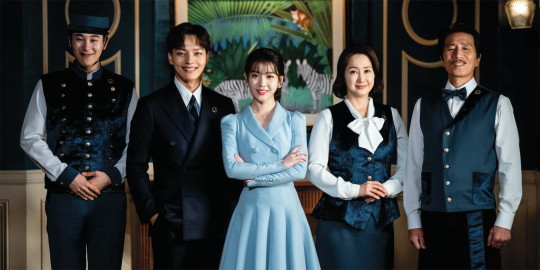
From left to right: Pyo Ji-hoon as Ji Hyun-joong; Yeo Jin-goo as Gu Chan-sung; Lee Ji-eun (IU) as Jang Man-wol; Bae Hae-seon as Choi Seo-hee; and Shin Jung-keun as Kim Sun-bi.
Released in 2019, Hotel del Luna was my introduction to the works of the Hong sisters as well as actors Yeo Jin-goo and Lee Ji-eun (IU), and what an introduction it was! The first episode of the show was excellent, giving us a hint of Man-wol’s tragic past that left me wanting to know more, then moving forwards in time to reenact that scene from Beauty and the Beast where Belle’s father is caught trying to steal a rose from Beast’s garden to give to Belle, and finally reaching present day as Man-wol tries to recruit Chan-sung and introduces him, and us, to this world of gods, ghosts, and souls with lingering grudges, that reminded me of the wondrous world of Harry Potter. Everything clicked for me in this episode, from the beautiful cinematography and music to the strong performances, particularly IU’s as Man-wol who knocked it out of the park and, incidentally, has a most impressive wardrobe and an uncanny ability to look amazing in every single one of her outfits. This was a highly promising start for my next modern fantasy show after Goblin and I couldn’t wait for the next episode. But what is this show about and why should you watch it?
Plot synopsis
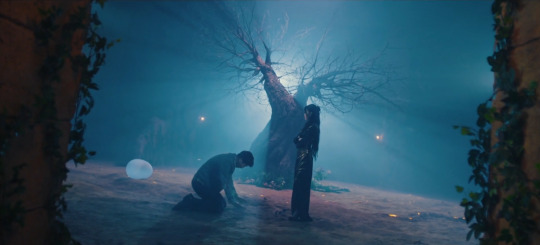
21 years ago, Gu Chang-sung’s father cut a deal with the beautiful and mysterious owner of Hotel del Luna, Jang Man-wol, so that she would save his life in exchange for his son. Regretting the deal afterwards, the father left the country with his son hoping to spare him his fate. Believing himself to be safe, Gu Chan-sung has returned to work as assistant manager in one of Korea’s top hotels but Jang Man-wol is intent on collecting on the old debt by having him work in her hotel instead. However, Hotel del Luna is not your typical establishment, as Gu Chan-sung soon finds out, providing a service for souls who need healing or have grudges left to settle before moving on. While initially afraid of the prospect of becoming assistant manager at a hotel that serves ghosts, Gu Chan-sung finds himself intrigued by the challenge and curious about the story of the beautiful owner who runs it.
A magical atmosphere

Stepping into the world of Hotel del Luna feels like taking the train at Platform Nine and Three-Quarters and attending Hogwarts. In fact, our intrepid hero, Gu Chan-sung, also receives a magical letter welcoming him as Hotel del Luna’s new manager, and while there’s nothing magical about the subway that takes him there Jang Man-wol does use a little magic to ensure their first encounter goes undisturbed. The hotel itself reminded me of Hogwarts, not because it is filled with ghosts and can only be found by them (and the very much alive and fearful human manager), but because of the feeling of perpetual wonder knowing that behind every door lies a new magical mystery waiting to be discovered, be it a room only people who are alive can enter but not exit, the sky lounge, a swimming pool that is actually a beach in some undetermined plane of existence, or a beautiful garden with a magical tree that holds one of the hotel’s biggest secrets. Of course, one should not forget CEO Jang Man-wol (if one wishes to live) who, while certainly a very different character from Albus Dumbledore in terms of personality, always knows more than she’s letting on and is usually in control of any situation, even if the outcome isn’t always the one she anticipates. There is also the wonderful supporting cast in the form of the different incarnations of the deity Ma Go-sin (played by Seo Yi-sook, who looks like she’s having a blast playing the different sides of the goddess), a reserved but diligent Grim Reaper (played by Kang Hong-suk), and the welcoming staff of the hotel, represented by the trio of Kim Sum-bi (the bartender), Choi Seo-hee (the room manager), and Ji Hyun-joong (the hotel receptionist).
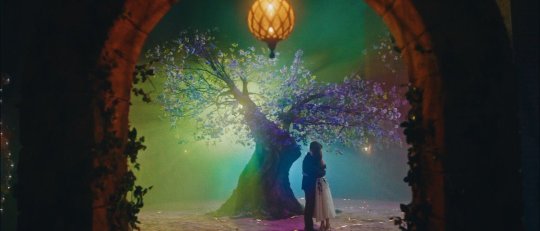
In the same way we cannot divorce Harry Potter from its music, given its distinct signature by that legend that is John Williams, I cannot forego mentioning Hotel del Luna’s mysterious, magical, and ethereal, instrumental soundtrack. Let me take you on a brief musical tour, shall I? Let’s start by taking subway line 4 and going to Hotel del Luna. The receptionist seems to be asleep so why don’t we let ourselves in? Wow, looks like the hotel’s throwing a party, apparently they’re welcoming human guests for the first time in years and the staff is particularly excited about it. That explains how we managed to get in (remember, this is not really a hotel for living, breathing, people). I can see that the bartender is busy receiving food orders and members of the staff are decorating the hall with real flowers. Hey, where’s that kid sneaking off to? Let’s follow him. Oh, that’s the Samdocheon Tunnel, which marks the boundary between this life and the afterlife. The Grim Reaper and the manager are there to bid farewell to one of the hotel’s guests. Apparently, there’s a bridge beyond the tunnel that takes 49 days to cross! I’m not eager to cross it just yet so let’s return to the hotel. Wait, why is there water everywhere? Looks like a water god managed to get past the receptionist (not that difficult when he’s asleep) and the CEO isn’t very happy about it. Yup, she definitely doesn’t look happy. We’d better make our exit before she figures out we shouldn’t be here.

To complement this excellent instrumental soundtrack, my favourite among all the kdramas I’ve watched to date, there’s an amazing selection of songs by artists like Red Velvet, TAEYEON, Heize, Punch, Chung Ha, and Paul Kim, among many others. IU herself sings an absolutely beautiful song that plays in one of the most highly-anticipated scenes of the show but which, sadly, has not been released. However, just as important as having a great soundtrack is using it well. If you’ve read my reviews of Angel’s Last Mission: Love or Strong Woman Do-Bong Soon, you should have an idea of how much I value using the right music at the right time to convey or accentuate the proper emotions during dramatic, comedic, or romantic scenes. Correct music usage can lead to your soundtrack being memorable, whereas incorrect music usage will surely render it forgettable. Fortunately for us, Hotel del Luna knows precisely when to use its music and how. It knows when levity is called for and when it’s not, when to highlight the wondrous side of magic and when to show its darker side, when to use Heize’s “Can You See My Heart” or Punch’s “Done For Me.” I believe it was John Williams, when talking about the music of the original Star Wars trilogy, who said that he wanted the score to tell the story of what was going on in the screen. I believe Hotel del Luna’s score achieves this feat.
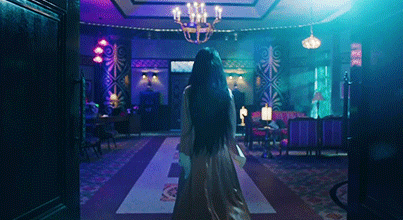
Another aspect that contributes to the magical atmosphere of the show is, without a doubt, its incredible cinematography (from camera angles, through its beautiful use of lighting and colours) which, combined with its excellent score, can create scenes that are best defined as poetry in motion. I particularly liked how it favoured studio sets for shooting many of its scenes, giving the sensation that we’re watching a superb play that encourages us to send our imagination into overdrive. Even some of the more noticeable VFX work, like the city view from the hotel’s sky lounge plays into the notion that one cannot always tell what’s real and what’s fake in Hotel del Luna, as Man-wol warns Chan-sung that the view from the sky lounge is not from this world, but the fall will kill him just the same (Man-wol being Man-wol). Because I’m not knowledgeable enough to explain the show’s cinematography in technical terms, I’ll leave you with a trailer that captures some aspects of it and, luckily, also showcases Jang Man-wol’s incredible selection of dresses.
youtube
A part of a greater whole
In my review of Bring it on, Ghost I mentioned the show followed a certain formula that is often poorly executed in Western shows. There is a main story-arc that encompasses the whole of the show and there are side stories where our protagonists confront the “ghost of the week.” One of the strengths of Bring it on, Ghost lied in how these side stories would sometimes tie into the main story or would be used to expand on a character’s backstory so that they rarely came across as filler. Hotel del Luna executes the same formula with a lot more thought and care, often laying out the groundwork for events later down the episode, what is expected, or even later down the show, what is a bit more impressive. The Hong sisters remain true to their initially-stated intention throughout the show and reinforce this with the aid of these side stories, preparing both Gu Chan-sung and us for the inevitable dénouement of the show. Let me try to illustrate my point by way of an example. I don’t want to give more for fear of completely spoiling the show for you.
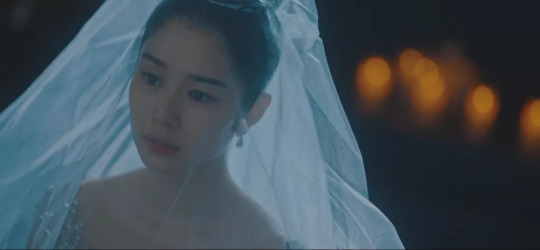
Episode 5 tells the story of a ghost bride whose parents want to give a soul wedding so she will be able to peacefully pass into the afterlife. Unfortunately, the chosen partner for this soul wedding ends up being Gu Chan-sung’s best friend, Sanchez, so while Man-wol goes shopping as Audrey Hepburn with the parents’ black card (our girl has very expensive tastes), Gu Chan-sung tries to figure out a way to spare his terrified friend. After some twists and turns, what is often the case with this show as the truth is not always what it seems, it is revealed that it is actually the groom’s parents who want to marry off the bride so she’ll let go of their son, who’s in a coma. For those who’ve watched Bring it on, Ghost, the parallels with the ghost side story from Episode 10 are fairly evident, as the ghost bride needs to find the strength to let go of the person she loves and she ultimately does so in one of the most beautifully composed scenes of the show. This is one of those “poetry in motion” scenes I was talking about. As the groom runs away in shock and fear, the bride gathers the courage to cut the red string of fate tying them together, under the intent gazes of Gu Chan-sung, dressed as the groom, and Jan Man-wol, dressed as a bride (in red).
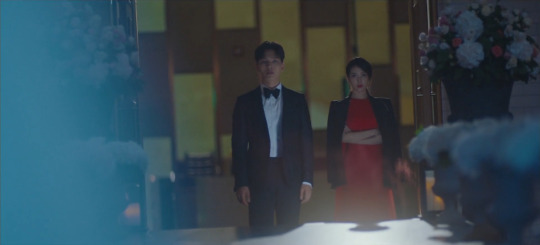
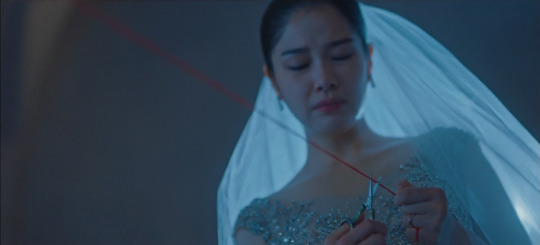
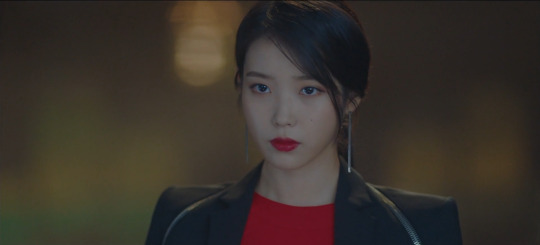
You need a stronger will to let go than to hold on.
This scene is a portent of events yet to come, when the day finally arrives where Chan-sung and Man-wol will also have to part ways. Indeed, several episodes later, the room manager will remind Gu Chan-sung of the words Goddess Ma Go-sin then told the ghost bride, “You need a stronger will to let go than to hold on.” The bride’s selfless act of letting go of the person she loves, breaking free from her earthly tether of her own volition, can be seen as a challenge to Man-wol, whose hatred for the man who betrayed her has been her sole drive for the past 1,300 years but also a curse that has bounded her to the hotel and prevented her from dying. Could she, like the bride, unburden herself by letting go of her hatred? Is it possible for someone with such a long and deep resentment to simply let go? This is a recurring question throughout the show and one that puts her at odds with her increasing desire to protect Gu Chan-sung, as she fears her actions, born of her hatred for the people who wronged her, might end up harming the man she loves.
Side stories such as this one often give us further insight into Man-wol, whether it be a glimpse of her past or challenging her beliefs, making her question herself and her actions, however briefly.
A fairy tale romance

Man-wol is a tsundere character, both a Beauty and a Beast, who has been nursing a thousand-year-old grudge against the people who betrayed her and consequently filters every human interaction through a lens of cold cynicism, expecting the worst from people. Chan-sung on the other hand, is a proper gentleman, a type of character we don’t often see in kdramas and a natural consequence of his training as a hotel manager. He’s friendly, cultured, well-mannered, kind, clever, and someone who's very much in control of his emotions most of the time. The evolution of the relationship between these two characters is the centrepiece of Hotel del Luna, a breath of fresh air in a landscape that often feels the need to use love triangles, or other polygons, as a shortcut to properly fleshing out the relationship between two characters. While there are elements of a love triangle present, such as expressions of jealousy for the sake of comedy, Hotel del Luna chooses to forego this trope and commit fully to the main characters’ fairy tale-like romance.

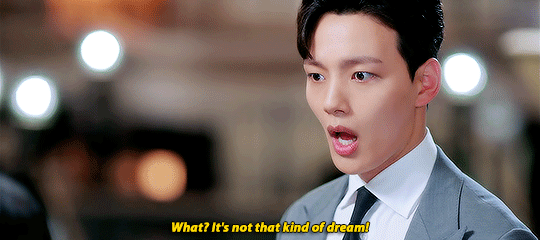
When you tell her you’ve been dreaming about her.
Another trope the Hong sisters mostly dispense with is that of misunderstandings, which are kept to a bare minimum, as Man-wol and Chan-sung are very open with each other regarding their thoughts and feelings, although Man-wol is, understandably, less transparent about her feelings in the beginning. It was incredibly refreshing to witness two characters that could guess each other’s thoughts and were willing to have an open and honest conversation about it rather than to hold back for the sake of drama. Of course, this did become somewhat frustrating for Man-wol (and fun for us) when Chan-sung started gaining more confidence, feeling at ease with Man-wol, and rebuking her selfish or materialistic actions. Their playful banter and bickering throughout the show is, to my mind, a clear indication that they’re comfortable with each other, as strong a sign of the chemistry in their relationship as half a dozen kisses, if not a better one, what is a good thing because those are few and far between. On the other hand, it makes those moments much more valuable and meaningful. The love between Man-wol and Chan-sung comes across in the gestures they make, in their facial expressions, in the words spoken and left unsaid. When Man-wol tries to comfort Chan-sung but doesn’t know how (Video), when she confesses she wants him to stay with her till the end and they share an intimate hug (Video), when Chan-sung breaks down and cries at the thought of not being able to see Man-wol ever again (Video), when the two have a conversation on the balcony under the moonlight (Video)... These are a precious few examples of the beauty, strength, and depth of feeling, of their relationship.

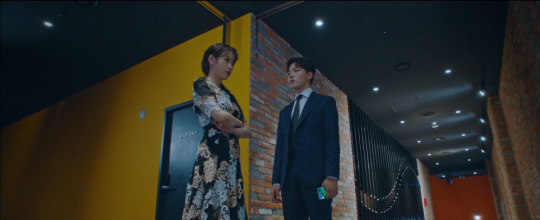
When the adult catches you in a lie.
While Man-wol is not the same ruthless person she was at the beginning of the show as she is at the end, she still retains some elements or traits of her personality throughout the show (there’s still a little tsun in her dere), as it should be. In one episode Chan-sung is remarking upon how much nicer she has become and she replies, “Gu Chan-sung, you’ve made leaves and flowers grow and have changed me a lot. But you won’t be able to change my core personality. Don’t even expect that.” Even as she says this you can see her looking a little uneasy about something, a little girl about to be caught in a lie by the adult who’s trying to keep her out of trouble. It is thanks to Gu Chan-sung’s patient and enduring love, that protected her from the worst aspects of her own self, that Man-wol is able to let go of her anger, both literally and metaphorically. But Man-wol also deserves praise, as she reciprocates Chan-sung’s love and equally tries to protect him from the dangers of this new world he has entered but most of all from herself, to the point she is willing to renounce her revenge and extinguish her existence to ensure she can never harm the man she loves.

Conclusion
It should be evident by now that I absolutely love this show and it is, without a doubt, my favourite out of all I’ve watched thus far, including Goblin. This is not to say the show is without flaws. Its almost single-minded focus on the story of Man-wol and Chan-sung has some collateral damage, most notably in the form of a character’s loved one, an event used as a means to highlight the pain experienced by those left behind, anticipating the day when our main protagonists will be forced to part ways. In another case, a poignant encounter for Chan-sung is not properly fleshed out, perhaps intentionally so but it seems like a wasted opportunity. Additionally, the introduction and development of the secondary villain’s arc (Man-wol is both the love interest and the main antagonist) felt a little weak, but is still a functional plot device that leads to some of the show’s best scenes. Finally, there is also the way the Hong sisters handled the riddle of Chan-sung’s dreams, which I may address in a separate post because it has too many spoilers.
If you’re a fan of fantasy dramas like Goblin, there’s simply no reason for me not to recommend this show and, hopefully, I’ve given you a few to persuade you as to why this is such a standout drama and, to my mind, the Hong sisters’ best work to date. It’s even on r/KDRAMA’s banner as one of those must-watch shows. If you do decide to watch it, I advise you to pace yourself so you don’t have to say goodbye to Hotel del Luna’s wonderful family too soon.
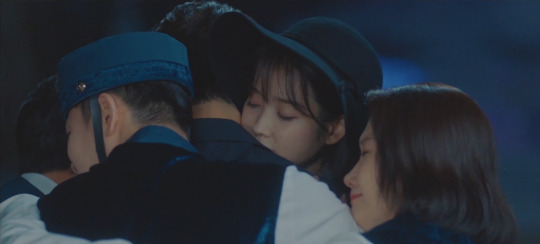
48 notes
·
View notes
Text
Title Oninaki Developer Tokyo RPG Factory Publisher Square Enix Release Date August 22nd, 2019 Genre JRPG, Action RPG Platform PC, Nintendo Switch, PS4 Age Rating Teen Official Website
Oninaki, the latest release by Tokyo RPG Factory, is an action JRPG whose core is an exploration of belief-based concepts involving life and death. The game introduces its own religious precepts; a foundation for the story and unfolding events. Approach it strictly as a game and you may miss it, but understanding the underlying intentions of questioning our own predispositions towards life, death, and faith, and Oninaki may have something deeper to offer than at first glance.
Oninaki takes place in a world in which the principles of their religion shapes all. From society, to community, to individuals’ daily living, their precepts govern their lifestyles. In this world, the key precept is reincarnation; life, death, and rebirth as a new individual, void of any memories or connections to past lives. This principle implies a release from all bonds of the living world. Grief from loved ones left behind or regret held by the deceased may interrupt this reincarnation cycle, preventing souls from leaving the Beyond and becoming Lost. These Lost become trapped in the Beyond, a parallel plain that lies between the living world and the path onward to rebirth. The Watchers are a group of individuals who are dedicated to helping the Lost find peace and move on for reincarnation. Our main hero, Kagachi, is one such Watcher, assisting Lost souls make peace with any lingering regrets or attachments they may have. For if the Lost linger, they become consumed by their feelings and become the Fallen.
Kagachi will face many difficulties throughout his time as a Watcher. Unrest and dissatisfaction with the precepts of reincarnation are rising, as more individuals seek ways to keep their memories or meet loved ones after death. With the population turning away from their faith and violations against these precepts rampant, Kagachi and the other Watchers are faced with an ever worsening dilemma. Along with the increasing prevalence of Lost, as they cling to their past lives and loved ones, and increasing Fallen, as too many Lost are overcome by their feelings, an even greater threat reveals itself. Once terrorizing the world indiscriminately before being sealed away, the Night Devil, an entity supposedly born from lingering feelings of hated, is once again loose, terrorizing the population and bringing further disturbance to the reincarnation cycle. Along with a mysterious Lost girl named Linne, a connection between her, Kagachi and the Night Devil becomes evident. What does this all mean for Kagachi and what consequences to reincarnation will this connection have?
The story in Oninaki is framed around this principle of reincarnation. Life, death, and rebirth are the foundation in which all main and subplots are built upon. It’s also the means of how the story immerses us in the faith conversation, by approaching similar conflicts and questions that we may struggle with in regards to our own beliefs. The game’s religion is simple enough to understand, but allows for so much potential in regards to building and branching off of it. So I’m left more than a bit disappointed that the story itself is actually quite linear, never tapping into or taking full advantage of that potential. Simply put, I expected far more depth. I’ll admit that the story has its few unforeseen twists and an overall imaginative tone that kept me attentive throughout. Yet the main plot, in actuality, is really just a collection of quests and a mishmash of events that moves the story forward with minimal exploration into the thoughts and feelings of those involved. Rather than developing a deeper story, lore, or its characters, the game heavily favors implicit profundity, leaving it solely to us to derive deeper meaning from the narrative and events unfolding. Unfortunately, there just isn’t enough substance overall for any lasting immersion or profound impact.
Nevertheless, I will say that Oninaki has moments of brilliance that beget genuine intrigue. The promise for reincarnation directly muddling the values of one’s current life is a fascinating concept, as well as the value death has to bring about a new life should one feel dissatisfied. Also, the valuation of life itself is a topic we can all relate to, for in life we strive for happiness and fulfillment, yet are bound by societal, religious, and other frameworks. So while I do appreciating these few efforts made that successfully cause us to reflect on our beliefs as they relate to the narrative, or those efforts made to entice us to emotionally invest in the more significant characters, the severe lack of detail prevents any deeper, lasting emotional impact. Finally, I’m vexed that the concepts of life and death are not more fully explored. Despite being foundational to the story, too often life and death are treated as trite. In fact, many times throughout the game, the way death is discussed as it relates to sacrifice, illness, murder, suicide, loss, is almost careless, empty of its own significance, as well as its effects on the living, not to mention its direct tie to the major game elements that are the Lost and the Fallen. Again, there are flickers of excellence hidden in Oninaki’s story, as well as in the theological allusions and the questions posed. Yet, there’s also a wealth of potential here that could have been addressed and built upon for significant depth and it’s a disappointment how it never coalesces.
Not only the main story, but Oninaki‘s subplots and side stories also suffer from lack of depth. The majority of these revolve around Lost individuals and their lingering regrets, for regret is the main culprit for a Lost being a Lost. Although there is some variation as to the reasons for a Lost soul’s regret, those reasons never go beyond the obvious and the expected. Even if these reasons for regret are common, at least give me depth and uniqueness in the Lost’s individual backstories. Too often we simply run into a Lost who wants us to bring them to a specific person or place. Other than the relationship itself; spouse, child, parent, and sometimes the reason for their demise; murder, accident, illness, that’s all we ever receive. It results in a shallow, predictable narrative that hurts the overall effect and so these side-stories and quests come off as cookie-cutter, leaving a feeling of overt familiarity. There is such opportunity here for emotional depth as well as to add details relevant to the main story, but it’s just another opportunity missed.
This lack of depth hurts, but I believe its greatest harm is to Oninaki’s characters. Our main hero, Kagachi, is the strong, no-nonsense trope. And that’s it. Much of his personality, feelings, and relationships are implied, never receiving any meaningful development. He’s your typical blunt individual, indifferent to all around him. His character never grows or develops past this and that indifference to everything and everyone around him makes him a narrative detriment. There are several moments in the game that involve Kagachi and supporting cast members, some of whom supposedly have a deeper relationship with him. When these moments unfold, they falter in their emotional strength and fail to make the lasting impressions strived for. This supporting cast is equally unimpressive, as we learn nothing of them beyond their base personalities, their direct relationship to Kagachi, and their fates as the plot unfolds. Mayura, Kagachi’s childhood friend, and Linne, the mysterious young girl, are the two major side-characters, yet we never learn enough about them; their inner thoughts, their deeper feelings, to ever make a genuine emotional impact. Even as more of Linne’s story is unveiled, most of it regards who she is as a plot device and little to who she is as a person. They are unmemorable and they should not have been. Other characters receive even less and none are developed to the point that any of us would invest in them. I think the only characters that will stick with me are a few of the Daemon, including Aisha, Kagachi’s starting Daemon. She and the other Daemons receive backstory through Daemon Lore and hers in particular, along with the glimpses of personality we get from her, make for a captivating character. She and her story stand out so acutely in this sea of mediocrity. Even if learning about her is an extra task and, at times, interrupting to play flow, it is one of the few outstanding examples of the depth that should have been prevalent throughout. Other Daemons have appealing stories too, but the fact that the extra often outweighs Oninaki’s main story and characters is disappointing.
Narrative shortcomings aside, Oninaki’s gameplay possesses a similar degree of originality as its story. Gameplay is heavily dependent on its combat, leaving little room for exploration, or anything else for that matter. You fight until nothing’s left, and then move on. Fortunately, there’s a bit of innovation involved. Kagachi fights alongside his Daemons, Lost souls who choose to bind themselves to him. Each Daemon represents a different weapon, fighting style, and skill set, and as you continue using a particular Daemon, points in the form of Soul Stones are gained to unlock new skills, as well as unlocking Daemon Lore placed around the skill tree. Passive skills affect stats and activation speeds while attack skills have different ranges and attributes. Up to four skills can be assigned at a time for a Daemon and four Daemons can be assigned and switched in during combat.
More Oninaki on Page 2 ->
As for the combat itself in Oninaki, it boils down to using a general combo with the Daemon-specific weapon in tandem with attack skills. The Daemon mechanic is quite innovative and choosing the right Daemon for a given situation is key. Weapons and styles range from hard and heavy, to quick and close, to long range, projectile, and balanced. Finally, each Daemon also has an innate non-combat ability. For example, Aisha the katana wielder, offers a dash to Kagachi that helps put distance between attacking foes and Izana, the Scythe user, has a warp move that allows Kagachi to maneuver behind enemies. Several Daemon offer jump capabilities and few have defense abilities, such as raising shields.
Another mechanic to Oninaki’s gameplay is the Beyond. During the course of play, Kagachi can instantly shift through the Veil that separates the living world and Beyond to fight enemies, progress down blocked paths, or interact with the Lost. Also, both the living world and Beyond will each have their own sets of enemies to fight. At times, Kagachi will suffer Veil Blindness until defeating a specific enemy, which will restore his sight in the Beyond. Though the concept is amusing, this system could have lent itself to more exploration or innovative side play, breaking the monotony of strict combat-based play.
Besides direct combat and the unlocking and powering up of Daemons, there is little more to gameplay in Oninaki, but there are ways to improve your chances in more difficult fights. As you attack, you gain Affinity with your Daemon, represented by a percentage. As this increases past 100%, your attacks become stronger, but then defense diminishes past an Affinity of 150% and up to the max 200%. Also, once Affinity reaches 100%, you can Manifest, unleashing Kagachi’s power for a limited time strength boost. Certain passive and active skills have secondary benefits during Manifestation and when stacked, can turn the tide of any fight. Outside of direct combat, new weapons and buff/debuff lending Shadestones can be found, crafted, and equipped. Most new weapons will be enemy drops, but all weapons can be upgraded. The game’s sole shop offers the ability to upgrade weapons, socket Shadestones into those weapons, craft new weapons from old, and craft new Shadestones. Only three craftable weapons and Shadestones are available at a time and are randomly swapped and assigned after every one hundred Fallen slain.
As for Oninaki’s overall execution, combat is acceptable, with its strengths mainly in its creativeness. The variety of the Daemons, their exclusive weapons, and the many types of skills all provide an original touch to the traditional JRPG formula. And as I said, I really appreciate the Daemon Lore and its direct implementation within the skill tree, as I found myself wanting to unlock them all. That allowed my experimenting with all the different Daemons rather than just sticking with the first four we find. Trying them all out, discovering their different skills, and mowing down waves of enemies can all be pretty fun. However, even with all the different Daemons and their unique characteristics, combat can become repetitive. The choice to go with a standard, unchanging combo per weapon, anywhere from five hits for light weapons down to a two hit combo for heavy weapons, quickly becomes stale and even the vast number of skills provided struggle to compensate. Also, there are just too many Daemon. Even after trying them all and expanding their skill trees, I found myself favoring a fraction of them, as others are either a chore to use or are too similar to the point of redundancy. Rather than so many, I would have preferred fewer if it meant a more robust combo system. Combos via directional input or a weak + strong, pattern based structure would have been a better choice. Combine those setups with personalized combos per Daemon and I believe Oninaki’s combat would have been incredible, far and away from the repetitive, and sometimes tedious, mechanic we have here.
This slideshow requires JavaScript.
Other mechanics, such as navigating the shop, accessing the Memories, Help topics, story recaps, and other resources in the menus, as well as the controls, all work well. Having simplicity in usage and accessibility to a database for everything encountered in-game is a welcome addition. The controls are fairly strong, in that both keyboard and controller setups are equally intuitive and easy to learn. I had zero problems with the default button layouts and yet you can customize, too. Always a plus. One aspect of control I took issue with is in regards to the delays between executing different actions. There is a noticeable pause that must be taken between, for example, launching a combo and healing. You can’t just heal, or you can’t just launch a skill after a combo. Rather, you must account for a delay. Now there are passive skills that allow you to minimize some of these delays in different actions. For example, the delay between using consecutive attack skills can be reduced for some Daemon, as well as beginning a combo immediately after a skill. Really though, I would have just preferred this being a non-issue in the first place. It’s both a needless bother and poor design choice. It’s not game breaking, but annoying enough for a mention.
The final aspects to address are Oninaki’s aesthetics and this, too is a mixed bag in terms of choices made and overall quality. Visually, Oninaki features some absolutely stunning artwork, depicting main characters and Daemons in gorgeous detail. Especially the Daemons, their depictions help immensely to remind us that these were genuine individuals with their own previous lives and personal stories. I almost wish this was a 2-D game if it meant having this level of artistic quality throughout. As for the 3-D work, it’s dull, unpolished, and uninspired in comparison. The character models are overly simple and bland, giving the game a dated feel. The enemies fare better, as their designs are imaginative and colorful, giving them more vividness compared to the human models. Many of the environments are also of better quality, bringing needed style and tone to the world. However, the backgrounds for these environments are often bland and the play areas themselves and inconsistently detailed. While some are gorgeous, dramatic, and lively, others are entirely void of energy. In these, once enemies are cleared, the areas are just too blank and empty. Lastly, I am impressed with the copious lighting effects. From the auras of buffs and Daemon switching and the glows and generous use of colors to demonstrate attack skill power and range, to the gentle lighting of serene landscapes and the abundant brightness of the bustling city, the lighting is incredible. It perfectly sets tones ranging from dire situations and intense fights to the tranquility of nature and the quiet calm of heart to heart moments. Visually, Oninaki is 2-D beauty and vividness plagued by bland 3-D designs.
Oninaki’s audio is strong, featuring a fitting soundtrack and impressive voice acting. The music lends itself nicely to both the particular events on screen and the overall tones of the game. Many of the tracks match the energy of a solid fight or convey the urgency of plot-moving scenes. All the tracks fit and all are a pleasure to listen to, even if some are too short and tend to get themselves lost during the action. There is also a slight overuse of silence in the game. I do enjoy it when it’s an opportunity to enjoy the ambiance, but the long, silent pauses between a track’s loop occur often enough to notice. As for the voice work in Oninaki, the voice acting is great, as it brings much needed life to a narrative in need of substance. I do wish it was fully voiced, since what we do get improves the experience. Instead, the rest of the time we only get single words, grunts, and other audio gestures during the majority of conversations. Fully voiced conversations during the entirety of the main quest would perhaps have encouraged me to further emotionally invest in the characters as well. This is one of the reasons why I felt more connected to the Daemons, as their Lore scenes are all fully voiced. Other than a few uninspired tracks, a silence overuse issue, and my want for full voicing, the audio is one of the most noteworthy aspects of Oninaki.
Oninaki could have been extraordinary. Artistic beauty, ingenious ideas, solid voice acting, and a story foundation open to endless potential, is utterly diminished by flat storytelling, zero character development, overall lack of narrative depth, gameplay design missteps, and lazy 3-D aesthetics. Perhaps a more generous reviewer would have scored Oninaki higher, but I cannot simply overlook the game’s compounding faults. It’s truly unfortunate, as there are glimmers of pure magic within and a little more would have made a remarkable impact. To experience all Oninaki has to offer and to find all of those moments of brilliance, be prepared to spend 30 hours or more to do so. It will take patience, as grind and fatigue will undoubtedly appear. Nonetheless, I personally found the experience worthwhile. Yet, if a more robust effort were made, Oninaki could have been a masterpiece; refined gameplay that matches its creativeness and a story that should have conveyed perceptions, ideas, and questions that challenge how one perceives life itself. So much potential untapped, I wanted to love this game so much more.
This slideshow requires JavaScript.
[easyreview cat1title=”Overall” cat1detail=”” cat1rating=”3″]
Review copy purchased by author.
REVIEW: Oninaki Title Oninaki
0 notes
Text
Title Katana ZERO Developer Askiisoft Publisher Devolver Digital Release Date April 17th, 2019 Genre Action platformer Platform Nintendo Switch Age Rating M for Mature 17+ – Blood and Gore, Strong Language, Suggestive Themes, Use of Drugs, Violence Official Website
It took all of my significant willpower not to litter this review of Katana ZERO with story spoilers. The game was so brooding, engaging and mysterious that I wanted to lay it all on the table and psychoanalyze every juicy detail. But for the sake of those who have yet to play this indie gem, I decided to hold myself back as much as humanly possible. Going into the game, all I really expected was a flashy and violent game, but instead Askiisoft (the team behind Tower of Heaven and OverPowered) brought their A effort. This is a dark, edgy and mysterious game, and one I’m happy I had the chance to cover. To see why I feel that way, just keep on reading.
After watching the Nintendo Direct trailer for Katana ZERO, all I really expected was an uber-violent action game. I would have been perfectly fine with that. But what I never could have deduced was how much lore sets the stage for the story. Sure, the violence is there and it’s a lot of fun, but that’s almost just the window dressing. The lasting appeal of this game is the unique story, and the way it is told. You play a silent assassin who lives in New Mecca whom the public knows as The Dragon. Your past is something of a blur, but you have a medal of honor from a bloody war that occurred a few years back. You’re given mission dossiers by a dour therapist who checks your state of mind after missions, and also gives you a handy booster shot. If that all sounds a little sketchy, that’s good. Cause this is a game that constantly made me doubt the trustworthiness of the narrators and characters. It also quickly becomes a game where you can’t even trust your own eyes, as reality becomes twisted and time itself seems to turn against you.
This slideshow requires JavaScript.
Speaking of time, that brings us to the game’s unique combat twist. For reasons I won’t get into, your character is able to manipulate time. This is not only handy, it’s necessary for survival, since one hit and you’re toast. Thanks to your time manipulation, you can literally rewind the clock when you die, and you’ll die a lot. More useful is how you can slow things down to an utter crawl. While that does give you a distinct advantage, it’s not an unfair one. For one thing, you also go slower when using this skill. For another, you don’t get any real protection, and if a slow moving bullet hits you, you’ll die all the same. Oh and you have a meter that controls how long you can slow time, and once it’s depleted, it takes a while to cool down until you can use it again. In other words, the time control is a wonderful mechanic, but it is one that forces you to use it sparingly and think strategically. In fact, the entire game encourages careful consideration. Even though it’s full of combat, each room you enter is like a miniature puzzle, and it’s up to you to solve it while ensuring your survival.
I’m more than a little pleased with myself that I managed to take this screenshot.
Having said all that, keep in mind you still have a ton of freedom in how you go about executing your enemies. There’s no wrong way, so if you prefer going full kamikaze, you’re welcome to. If you are more of a stealthy ninja type, that works too. I personally preferred the more violent style, and rarely did much sneaking. Just be flexible, cause the enemies you face are smart and pay attention, and if you alert one of them, they’ll usually bring friends to investigate. But on the plus side, they’re just as fragile as you are, and connecting once with your katana blade will do them in. Thankfully, that’s not the only tool you have at your disposal. You’ll find a variety of them as you prowl each area, and they also do a great job of killing things. Better yet, many items can be thrown at foes, which opens up even more opportunities. Items will range from blunt instruments, like daggers and statue busts, to smoke grenades and much more. Just keep in mind these items are all single use, so you’ll need to get adept at using your trusty katana.
Bet you didn’t know that being an assassin requires good mental health.
My favorite thing about the katana is how fluid and effortless it makes combat. Though you can’t throw it, it has a pretty good range, and you’re able to use it while dodging. Even better is how you can slash upwards and diagonally, and you’ll get a little bit of an aerial lift. You’re like a murderous dolphin, and have a great economy of movement. I took great joy in waiting in stairwells for thugs to patrol, leaping into the air sword-first and dispatching them. But perhaps coolest of all is how your katana can deflect bullets. Yes, you heard that right. It takes precise timing, but by freezing time just after a foe shoots a bullet, you’ll have ample time to swing and deflect it back at them. I took a while before I got good at this technique, but once I did, the combat really opened up. But before you get too cocky, understand that you can only realistically deflect two bullets before your time manipulation meter runs out, and you have almost no chance of deflecting a shotgun blast (though I did miraculously manage to do that once).
This slideshow requires JavaScript.
Besides the glorious combat, there’s also a shocking amount of story. There are recurring themes about substance abuse, the horrors of war, and the resilience of humanity. I was deeply surprised by the extent of branching paths in Katana ZERO. The game will remember your conversation responses and will react accordingly. Case in point, when I snuck into a building to murder my mark, the receptionist asked why I was dressed so strangely. I picked the most hilarious option, which was that I was cosplaying as “Pinkachu”. I met that same receptionist more than once, and her belief that I was a Pokémon cosplayer not only led to humorous results, it even let me avoid some trigger happy police. Depending on your dialogue decisions, you’ll also reveal little glimpses of the plot, and open up more options. It’s really satisfying, least of all because the writing for the game is really, really good. I didn’t find any grammatical problems at all in the dense script, and that made me enjoy the experience even more. When you toss a really quirky cast of characters into the mix, you have the makings of something special.
This slideshow requires JavaScript.
It would have been enough if everything I said thus far was the extent of it, but the excellence found in the other areas also applies to the visual side of things. Even if you don’t love pixel art, you’d be hard pressed not to find wonder in Katana ZERO. There’s a ton of bloody detail, neon-drenched lighting and wonderful character design. Normally I’d find something negative to say about the sound design, but that impressed me too. I love how they alternate between classical music in the calm moments and hard-rocking club music for the combat sections. The sound effects add to this as well, with the screams of foes, the gush of arterial spray and other elements that add to the grungy noir atmosphere of the game.
This slideshow requires JavaScript.
Now, while I loved almost every aspect of Katana ZERO, there were a couple small areas it faltered. One is that, wonderful as the story is, it was a bit hard to decipher at times. For one, I can’t say with certainty I understand the backstory for the main character, nor the motivations of others. That didn’t make things any less enjoyable, but I also have a fuller appreciation of things I fully understand. Also, though the autosave feature worked most of the time, there was one time that it didn’t, and forced me to replay one chapter. Lastly, though the game is a lot of fun, it’s also very short. I couldn’t have spent more than 4-5 hours playing it, and though there is a bit of replay value if you want to choose different branching paths and try for different endings, I still wish I was able to spend more time in this world.
This slideshow requires JavaScript.
Having said all that, it’s impossible for me not to recommend Katana ZERO. Not only is it a great game, it’s a perfect example of why I have such faith in indies. For $14.99, you get a fantastic and unique action platformer with some of the most phenomenal boss fights I’ve ever experienced. Sure, it could be longer and the plot could make more sense, but it’s still a wild and satisfying ride. And when you factor in how one ending hints at a sequel, it’s very possible my minor complaints could be cleared up in the near future. I’m really happy Askiisoft and Devolver Digital brought this gem to Switch, and I can’t wait to see the next game they have up their voluminous sleeves.
[easyreview cat1title=”Overall” cat1detail=”” cat1rating=”4″]
Review Copy Provided by Publisher
REVIEW: Katana ZERO Title Katana ZERO
0 notes